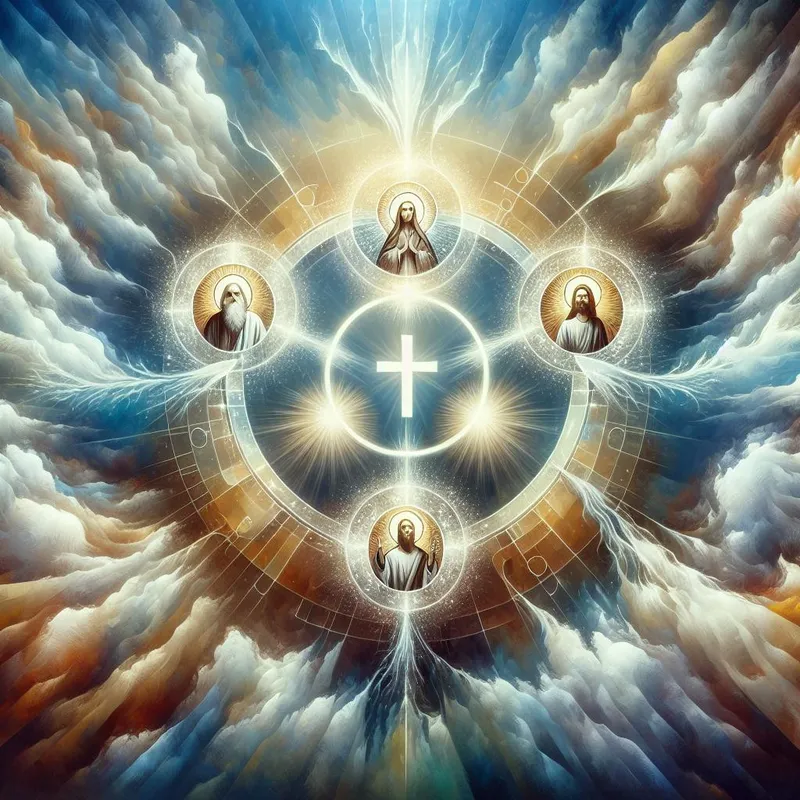
"Unveiling the Divine Mystery of the Trinity Bible: A Christian's Guide"
Posted on 04 July 2024
Understanding the Trinity in the Bible
The concept of the Trinity is one of the most challenging aspects of Christianity to fully comprehend. It is a concept that is beyond human understanding, as God is infinitely greater than we are. While we may not be able to fully grasp the intricacies of the Trinity, it is important to recognize that it is based on the teachings of the Bible.
One God, Three Persons: The Bible teaches that there is only one God (Deuteronomy 6:4; 1 Corinthians 8:4; Galatians 3:20; 1 Timothy 2:5), but it also reveals that God exists in three distinct Persons - the Father, the Son (Jesus), and the Holy Spirit (Genesis 1:1, 26; Matthew 3:16-17; 2 Corinthians 13:14). The term "Trinity" is not found in Scripture, but it is used to describe this triune nature of God.
Plurality within God: In several instances throughout the Bible, there is an indication of plurality within God. For example, in Genesis 1:26 and Isaiah 6:8, God uses plural pronouns like "us" and "our" when referring to Himself. This plurality suggests that God consists of more than one Person. Additionally, the Hebrew word for "God," "Elohim," allows for a plural interpretation.
Distinct Persons: The members of the Trinity are distinguishable from one another. In passages like Psalm 110:1 and Psalm 45:6-7, the LORD (God the Father) is distinguished from the Lord (God the Son). The Holy Spirit is also distinguished from both the Father and Jesus in various passages (Numbers 27:18; Psalm 51:10-12). These distinctions demonstrate that each Person of the Trinity has a unique role.
Deity of Each Person: The Bible affirms that each member of the Trinity is fully God. The Father is referred to as God (John 6:27; Romans 1:7; 1 Peter 1:2), Jesus is identified as God (John 1:1, 14; Colossians 2:9; Hebrews 1:8; 1 John 5:20), and the Holy Spirit is described as God (Acts 5:3-4; 1 Corinthians 3:16). This emphasizes the divine nature of each Person within the Trinity.
Subordination within the Trinity: While each Person of the Trinity is fully God, there is a sense of subordination among them. Scripture reveals that the Holy Spirit is subordinate to both the Father and the Son, and Jesus is subordinate to the Father. This internal relationship does not diminish the deity of any Person within the Trinity but reflects the mystery of their unity and roles (Luke 22:42; John 5:36; John 16:13-14).
Distinct Roles: Each member of the Trinity has different tasks. The Father is the ultimate source and initiator of creation, revelation, salvation, and Jesus' works (1 Corinthians 8:6; John 3:16-17; John 5:17). The Son acts as the agent through whom the Father accomplishes these works (John 1:3; John 16:12-15; Matthew 11:27). The Holy Spirit serves as the means by which the Father carries out His works (Genesis 1:2; John 16:13-14; Acts 10:38).
Understanding the intricacies of the Trinity can be challenging, but it is important to remember that our finite minds cannot fully comprehend an infinite God. While efforts have been made to illustrate the Trinity through analogies like an egg or water, these analogies fall short in capturing the true essence of the Trinity.
Why This Matters
The concept of the Trinity holds significant theological importance because it shapes our understanding of God's nature and His relationship with humanity. Recognizing the triune nature of God allows us to comprehend how God can be both personal and transcendent, immanent and active in our lives. It also helps us appreciate the love and unity within the Godhead, as each Person of the Trinity is intimately involved in our salvation and spiritual growth.
Think About It
- Reflect on how the concept of the Trinity impacts your understanding of God's nature and relationship with humanity.
- Consider the implications of the Trinity for your own spiritual life. How does it affect your view of prayer, worship, and fellowship with God?
- How does recognizing the distinct roles within the Trinity deepen your appreciation for the work of each Person in your salvation?
